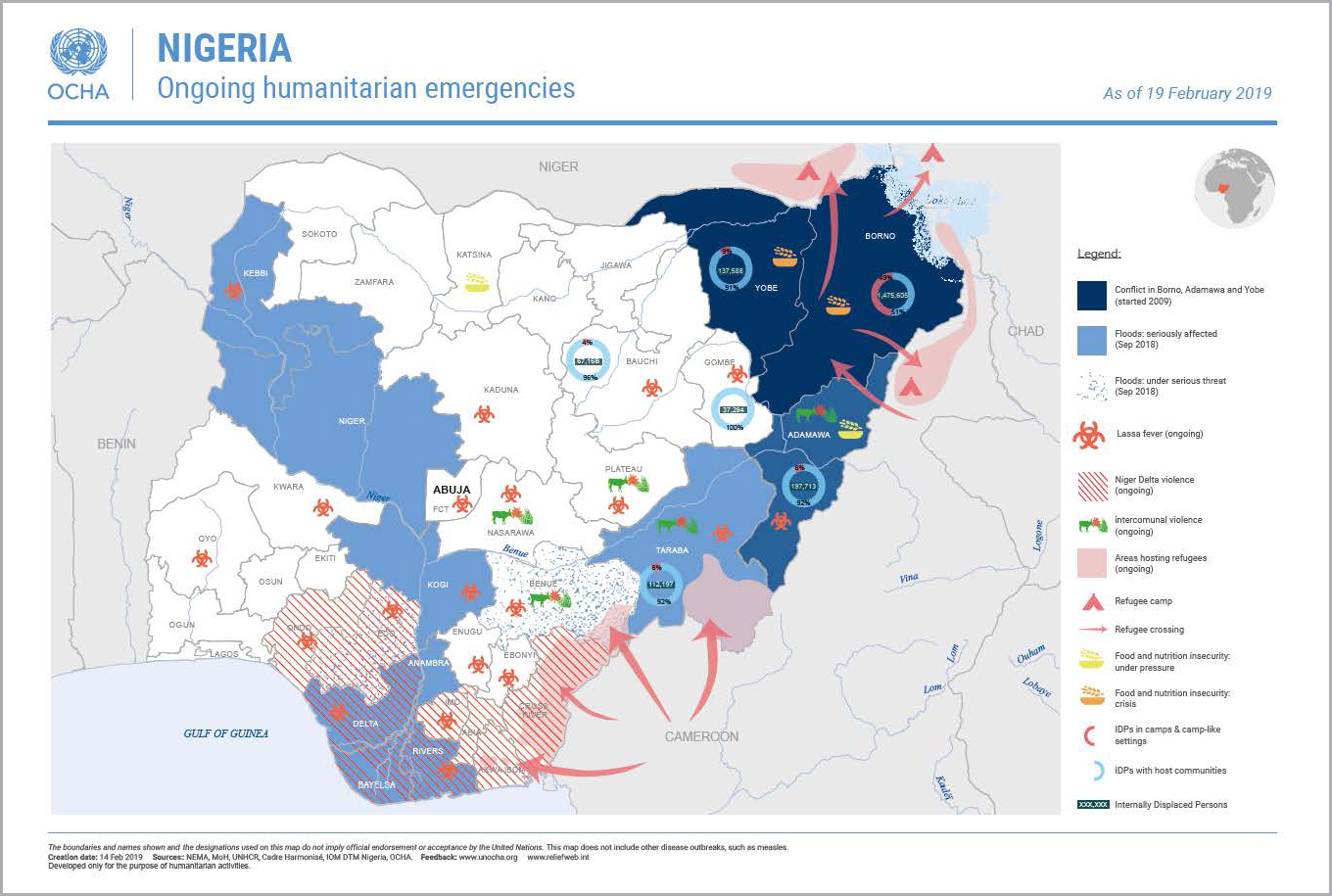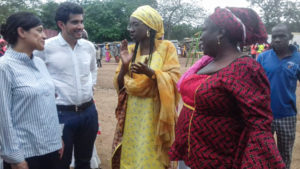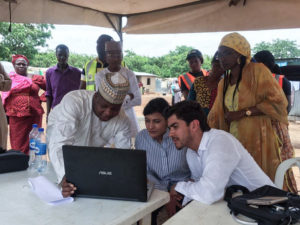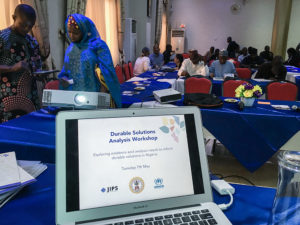A decade of conflict and continued violence by non-state armed groups and military operations are affecting millions of people in north-eastern Nigeria. Estimates put the number of internally displaced persons (IDPs) at 2 million (Source: DTM, Round XXIV, August 2018), with over 80% being in Borno State. The government and the humanitarian and development community are working together to support displaced populations but given the instability in certain regions, working on durable solutions for IDPs and refugees has proven challenging.
Thus, the National Commission for Refugees, Migrants and IDPs (NCFRMI), the Nigerian government agency mandated to lead and coordinate responses directed at these groups with a focus on the provision of durable solutions, requested JIPS’ support to strengthen their capacity in building the evidence base needed to inform durable solutions planning and programming. This would help improve existing data processes and complement the Commission’s recent efforts to develop a profiling approach and mobile application, currently mainly centred around registration.
During a scoping mission in May 2019, supported by the UNHCR country office in Abuja, our Head of field support and capacity building, Isis Núñez Ferrera, and Profiling advisor Andrés Lizcano Rodríguez worked with partners in country to assess concrete information and capacity building needs, and the interest and feasibility of a durable solutions analysis.

Source: OCHA ongoing humanitarian emergencies | Nigeria (19 Feb 2019)
It was an intense mission, starting off in the Nigerian capital, Abuja, with bilateral meetings with representatives from various stakeholders at the technical and decision-making levels. These included Nigerian government entities such as the NCFRMI, the country’s National Bureau of Statistics (NBS) and the Office of the Senior Special Assistant to the President on SDGs (OSSAP-SDGs), as well as international development and humanitarian actors such as UNCHR, IOM-DTM, OCHA, UNDP, REACH, iMMAP, and civil society through the iNGO Forum Nigeria.
Alongside these bilateral meetings, we undertook field visits to relevant displacement sites and neighbourhoods in and around the capital (Durumi Camp, Malaysian Garden camp, and Wassa host community), and organised a full day workshop on durable solutions and a half day training on profiling. We also held videoconferences with organisations and government institutions, including the Borno State Emergency Management Agency (SEMA), and the sector leads in Borno State, the region most affected by displacement caused by non-state armed groups.

JIPS and NCFRMI team discussing with IDP camp leaders

JIPS staff seeing the NCFRMI’s registration platform in action.
Both bilateral discussions and field visits proved valuable, for us as much as for involved partners, as they helped us get a better picture of ongoing activities related to durable solutions and displacement data, including:
The highlight of the mission was a one-day multi-stakeholder workshop on durable solutions analysis. We were delighted about the particularly strong attendance, with over 50 participants from 16 different organisations, including government agencies such as NCFRMI, NEMA and FEMA, and representatives of other Federal and State level institutions, as well as UN agencies, local and international NGOs.
In addition, participants actively engaged in the group work and plenaries, leading to rich and insightful discussions. As we learned, current efforts around durable solutions are still mostly limited to physical movement, such as return or relocation, or the facilitation of livelihood opportunities and skills acquisition. The workshop was thus a great opportunity to look at the use of a more comprehensive approach to durable solutions based on the eight criteria from the IASC framework.

JIPS facilitated a workshop on durable solutions with NCFRMI, UNHCR Nigeria and many other actors to discuss challenges and the way forward for better evidence and planning in this area.
A separate training workshop to introduce the profiling process, proved just as valuable. Building off the JIPS’ Essential Toolkit (JET), we worked with around 20 staff members of the NCFRMI on how to initiate and implement a profiling process. The session specifically elaborated on the importance of the collaborative approach, the use and relevance of a comparative analysis, and how profiling can support efforts to monitor progress and identify key obstacles towards durable solutions.
Our mission coincided with broader efforts in the country around a collective outcome on durable solutions. The focus currently is on defining indicators to measure progress, with the aim of achieving solutions for 60% of the displaced people by the end of 2021. This process is led by the Durable Solutions Thematic Working Group hosted by the Presidential Committee on the North East Initiative (PCNI), which will soon transition to the North East Development Committee.
The government’s commitment to work towards solutions to the protracted displacement situation has also become apparent through its contribution to, and endorsement of, the recently released Humanitarian Response Strategy for Nigeria 2019-2021. This ambitious action plan includes objectives related to strengthening the resilience of affected populations, promoting early recovery and voluntary and safe durable solutions to displacement, as well as supporting social cohesion.
Against this broader background, and building on the many discussions we have had during our mission with a wide range of actors, we believe there currently is a key opportunity for a more holistic approach to solutions analysis (whether for interim or durable / long-term solutions). This could also support stakeholders’ efforts towards prioritising and developing joint planning and programming for solutions. We look forward to supporting the government, humanitarian, and development actors in the next steps of this process.
—
Need tools to implement your own durable solutions analysis or profiling process? Check out the Durable Solutions Indicator Library and JIPS Essential Toolkit (JET) websites, and reach out to us at info@jips.org or on Facebook, LinkedIn or Twitter.